Louisiana Documents
Quitclaim Deed
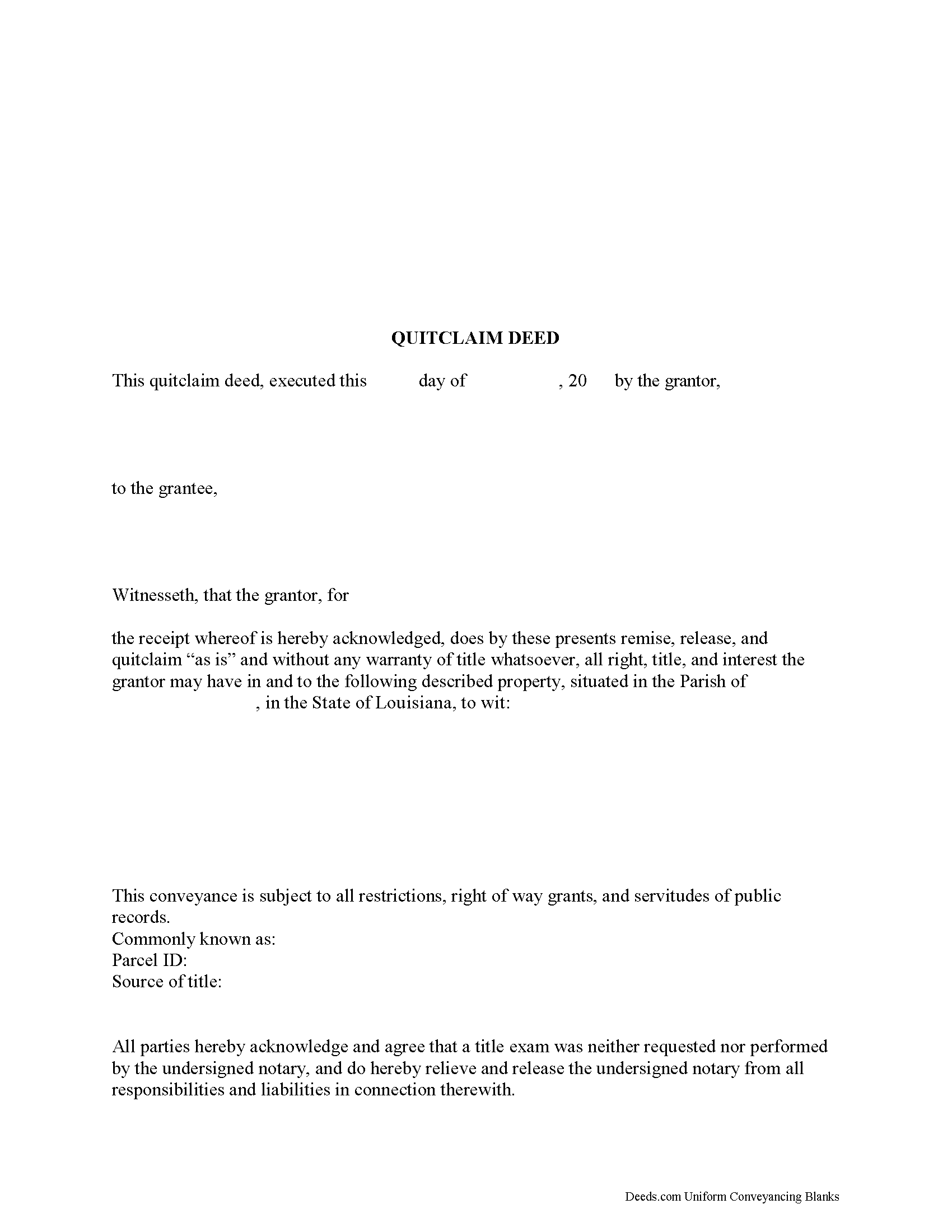
The state of Louisiana defines the minimum requirements to execute a lawful quitclaim deed in Civil Code 1839: an authentic act entered into the public record by formal recording. An authentic act is a written agreement, executed in the presence of a notary or other authorized official and two witnesses who are not otherwise part of the transaction. The code goes on to state that all grantors must sign the deed, and the name of each signor must be typed or printed immediately beneath the signature. CC 2503 states that every sale includes a warranty against eviction, so ensure that the lack of title guarantee is noted in the body of the document. CC 3352 codifies other requirements: the full name, domicile, and permanent mailing address of all grantors and grantees; the marital status, including spouse's full name (if any) of all parties; a statement detailing any change in the grantor's marital status; a complete legal description and the municipal ID or address of the property; and the ID number and typed, printed, or stamped name of the notary or attorney. These requirements are further supported by Louisiana Revised Statutes 35:11, 12. Finally, it is customary to include a rec... More Information about the Louisiana Quitclaim Deed
Gift Deed
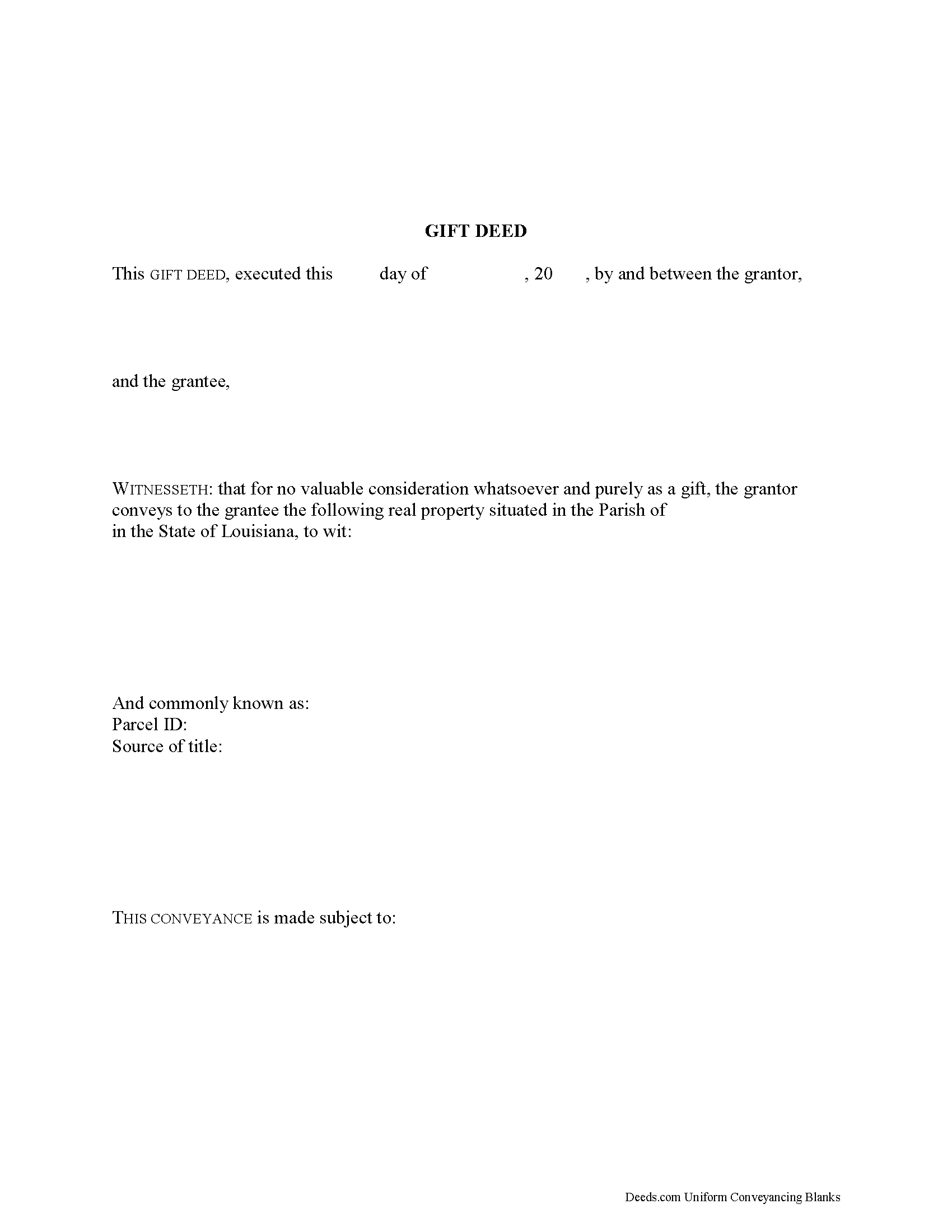
Gifts of Real Property in Louisiana
Gift deeds convey title to real property from one party to another with no exchange of consideration, monetary or otherwise. Often used to transfer property between family members or to gift realty as a charitable act or donation, these conveyances occur during the grantor's lifetime. Gift deeds must contain language that explicitly states that no consideration is expected or required. Ambiguous language, or references to any type of consideration, can make the gift deed contestable in court.
A lawful gift deed includes the grantor's full name and marital status, as well as the grantee's full name, marital status, vesting information, and mailing address. Vesting describes how the grantee holds title to the property. Generally, real property is owned in either sole ownership or co-ownership. For Louisiana residential property, "ownership of the same thing by two or more persons is ownership in indivision. In the absence of other provisions of law or judicial act, the shares of all co-owners are presumed to be equal" (La. Civ. Code 797). Community property is defined as property obtained by one or both spouses during their marriage (La. Civ.... More Information about the Louisiana Gift Deed
Warranty Deed
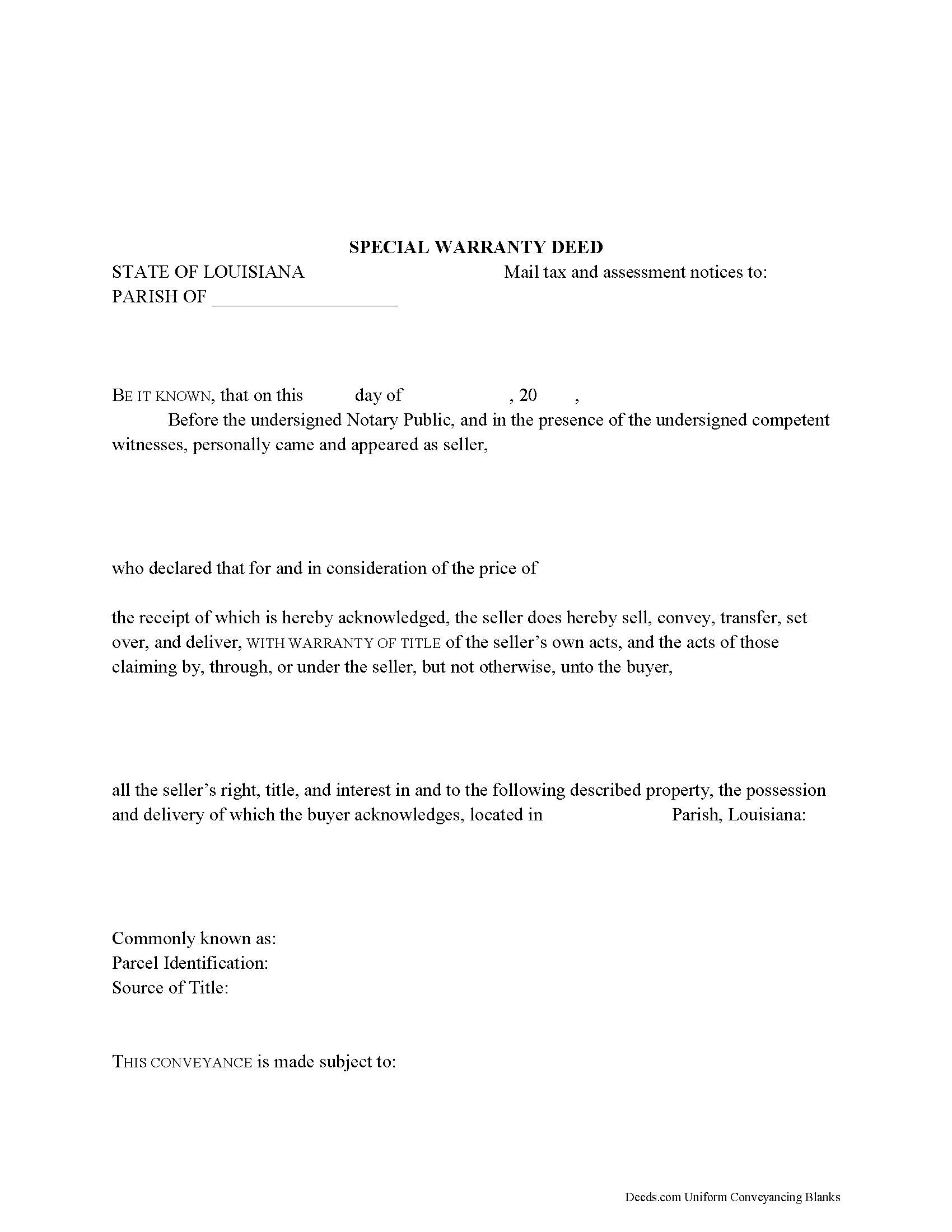
A warranty deed is a customary form for the conveyance of real estate in Louisiana. Deeds in this state may be referred to as Acts of Sales or Cash Sales. The Louisiana Statutes do not provide a statutory form for a warranty deed.
In Louisiana, the warranty for condition is referred to as redhibition. Redhibition is a civil action against the seller of a defective product or property, similar to lemon laws in other states. In a warranty deed, the grantor warrants the buyer against redhibitory defects or vices in the property. A redhibitory defect is defined as a defect that renders the property useless, or its use would be so inconvenient that it is presumed that the buyer would not have purchased the real estate had he known about the defects (CC 2520). In addition, the grantor also warrants to the buyer the ownership and peaceful possession of the property, and the absence of hidden defects. The seller also warrants that the property being sold is fit for its intended use (CC 2475). In Louisiana, a seller of real estate who is in good faith is allowed to limit the warranties made in regard to redhibitory defects by including a waiver of redhibition clause in the deed.
The... More Information about the Louisiana Warranty Deed
Special Warranty Deed
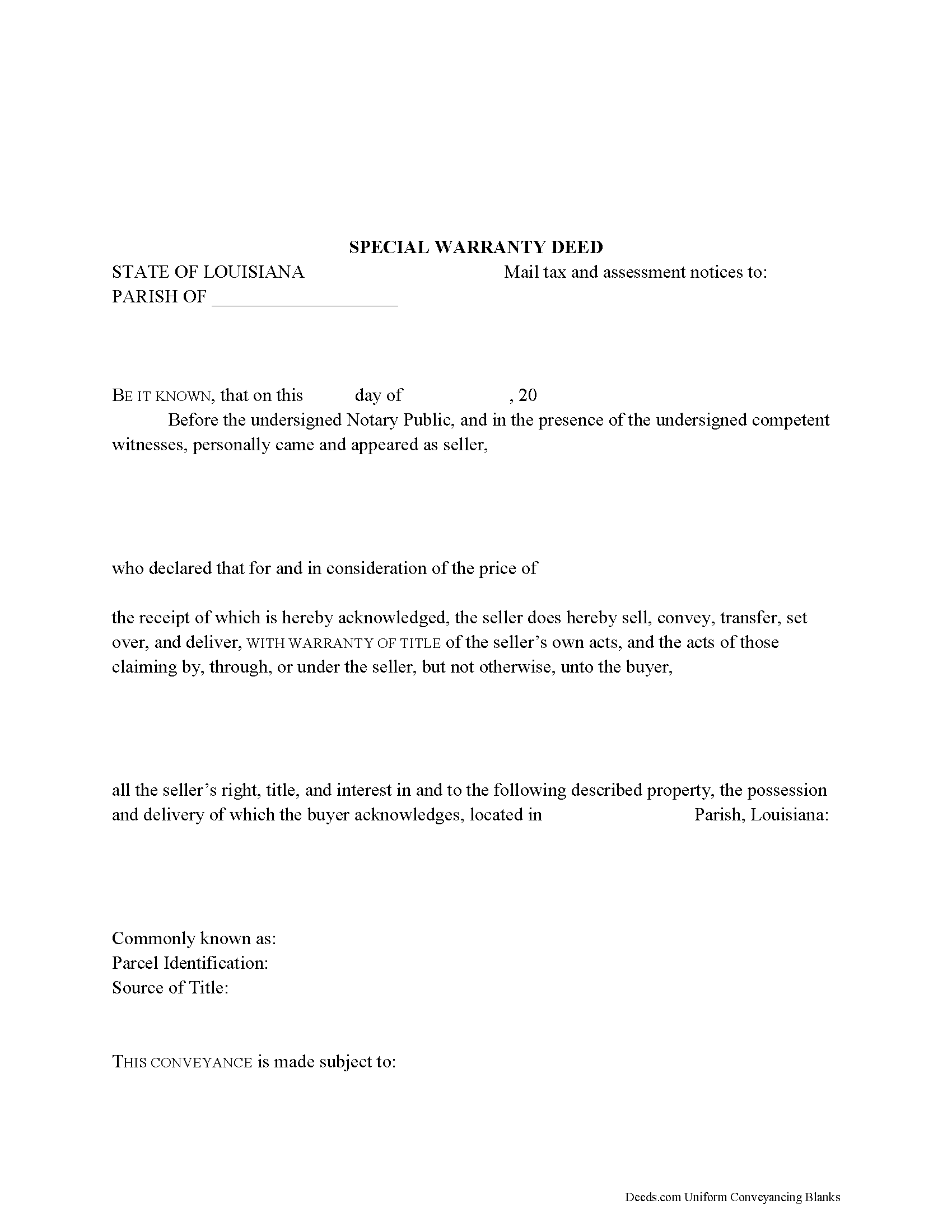
Sales of immovable property in Louisiana are typically referred to as acts of sale or cash sales. Louisiana Statutes do not provide statutory forms for deeds. Special warranty deeds convey fee simple title to the buyer with certain covenants on the part of the seller.
Typically, a special warranty deed contains an explicit covenant of warranty that the granting party will defend the title against claims arising by, through, or under him, with implied covenants that the granting party is lawfully seized and possessed of the property in fee simple and has a good right to convey it, and that the property is unencumbered, unless noted on the face of the deed.
In Louisiana, all sales contain the implied warranties that the buyer will have peaceful possession of the property and that such property is free of defects. Sellers also warrant that the thing sold "is fit for its intended use" (Civil Code Arts. 2475, 2524).
The promise that the property is free of defects is referred to as the warranty against redhibitory defects (CC 2520). A redhibitory defect is defined as a defect that renders the property useless, or its use would be so inconvenient that it is presumed that the bu... More Information about the Louisiana Special Warranty Deed
Grant Deed
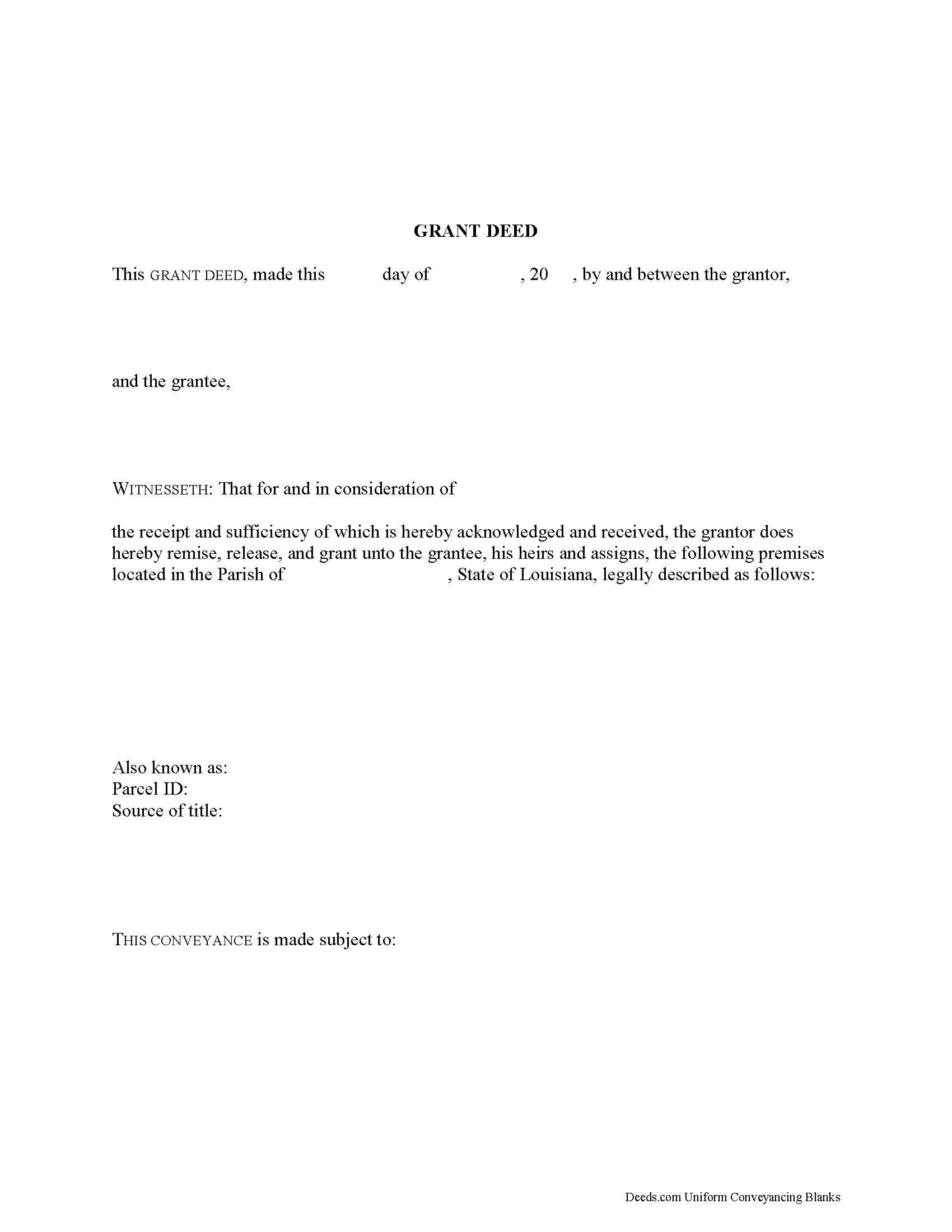
Sales of immovable property in Louisiana are typically referred to as acts of sale or cash sales. As proof of the sale and transfer of title, the seller executes and records a deed in the land conveyancing records of the parish where the immovable property is located. Louisiana Statutes do not provide statutory forms for deeds.
Grant deeds convey fee simple title to the buyer with certain covenants on the part of the seller. They typically imply that the seller holds title to the subject property and has possession, unlike quitclaim deeds. A standard grant deed covenants that the seller has not previously sold the real property interest conveyed to the buyer and that the property is being conveyed to the seller without any liens or encumbrances apart from those disclosed in the instrument of conveyance [1].
In Louisiana, all sales contain the implied warranties that the buyer will have peaceful possession of the property and that such property is free of defects. Sellers also warrant that the thing sold "is fit for its intended use" (Civil Code Arts. 2475, 2524).
The promise that the property is free of defects is referred to as the warranty against redhibitory defects (... More Information about the Louisiana Grant Deed
Affidavit of Death and Heirship
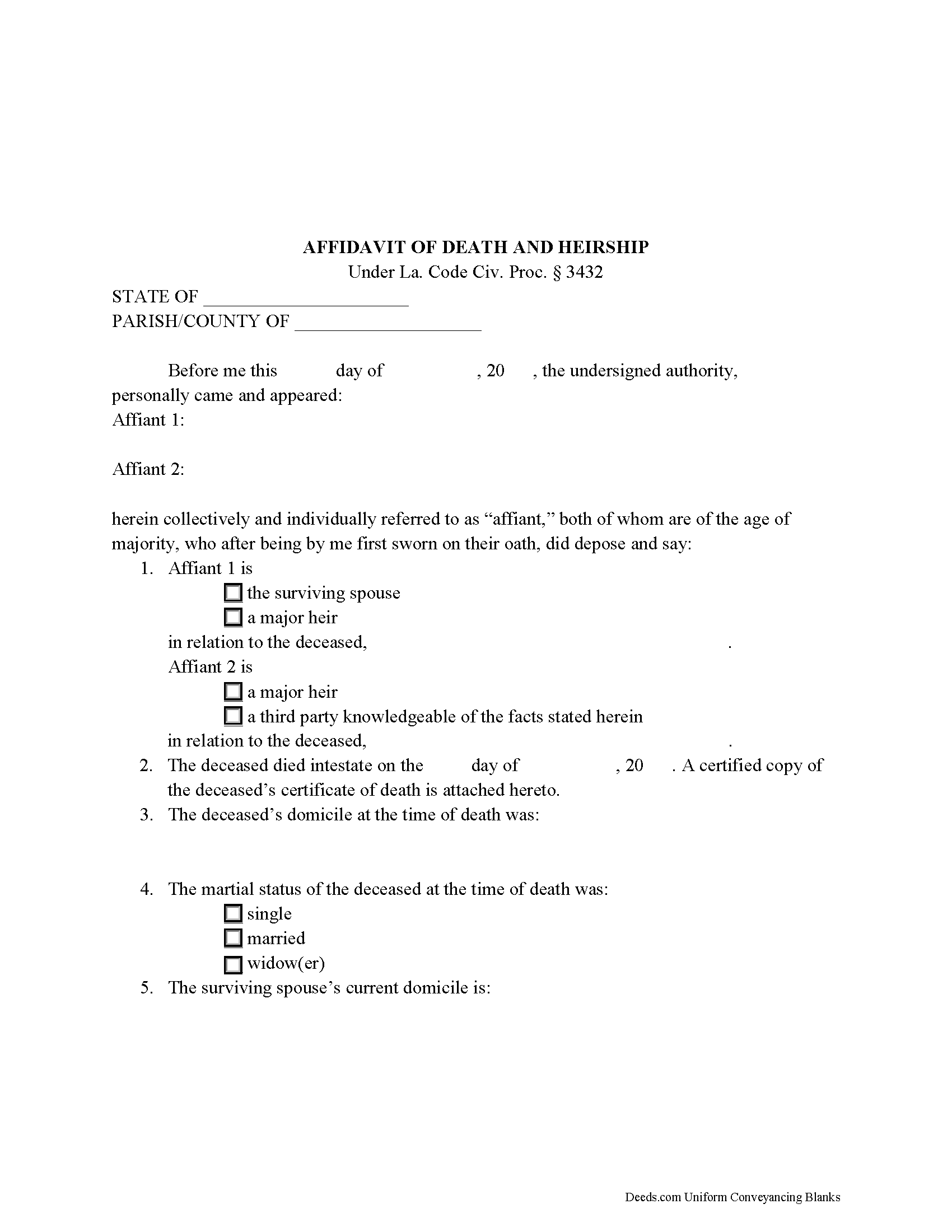
When a decedent dies, her property, rights, and obligations at the time of death, and those acquired after death, comprise her estate (La. Civil Code Art. 872). The legal process of transferring a decedent's estate to successors is referred to as succession in Louisiana.
By operation of law, a decedent's heirs automatically succeed to an interest in the decedent's property at the decedent's death (Civil Code Art. 935). Though a judicial process may not be required, heirs must take steps to "conform the record title to the rights of ownership provided by" Louisiana Code. Failure to do so "inhibits the ability of family members lacking record title to exercise their rights of ownership of property including the rights to sell, to encumber, and to seek federal aid" in the future. Filing the correct document in the parish land records updates the chain of title and provides a clear record of succession. Consult an experienced succession lawyer to advise which process is appropriate for the situation.
There are several alternate options in Louisiana for transferring property from a decedent to his heirs, such as small succession, a judicial process, or filing an affidavit under L... More Information about the Louisiana Affidavit of Death and Heirship
Correction Deed
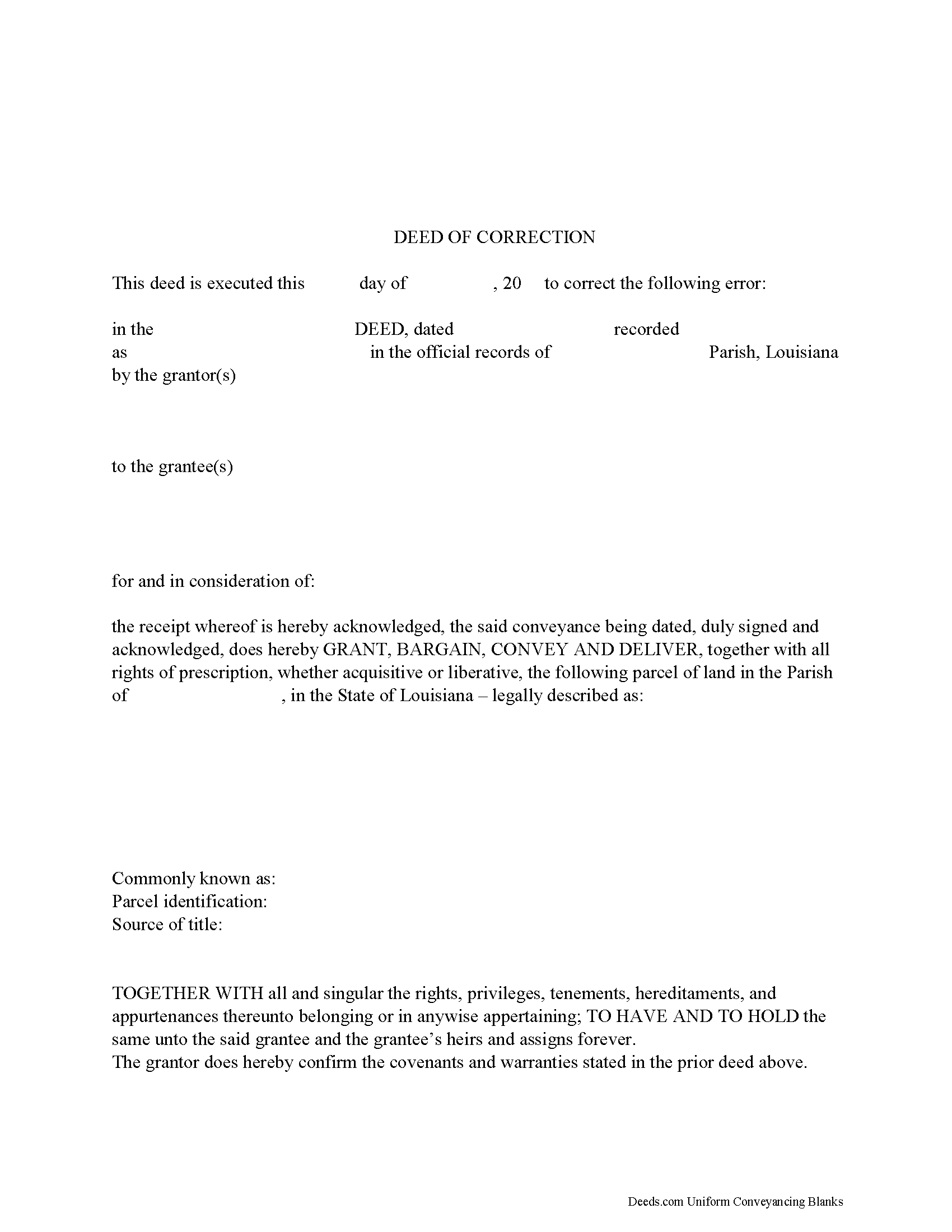
Use the correction deed to correct an error in a previously recorded quitclaim, warranty or grant deed in Louisiana.
In Louisiana, a previously recorded deed can be corrected by recording a second deed for the sole purpose of correcting the error and preventing potential title flaws, which may create problems when the current owner attempts to sell the property. The correction deed does not convey title but confirms the prior conveyance. For the most part it reiterates the prior deed verbatim, except for the correction.
Louisiana statutes also allow for an affidavit or act of correction, which must be executed by the notary or preparer of the original act or deed, or by a notary familiar with the records and the reason for the necessary correction. Such an act of correction is effective retroactively "to the date of recordation of the original act," but does not "prejudice the rights acquired by any third person before the act of correction is recorded" (LARS 35.2.1). It is usually reserved for clerical errors, such as minor omissions or typographical mistakes, sometimes called scrivener's errors.
When in doubt about the gravity of the error and its effects, it may be sa... More Information about the Louisiana Correction Deed
Act of Mortgage and Promissory Note
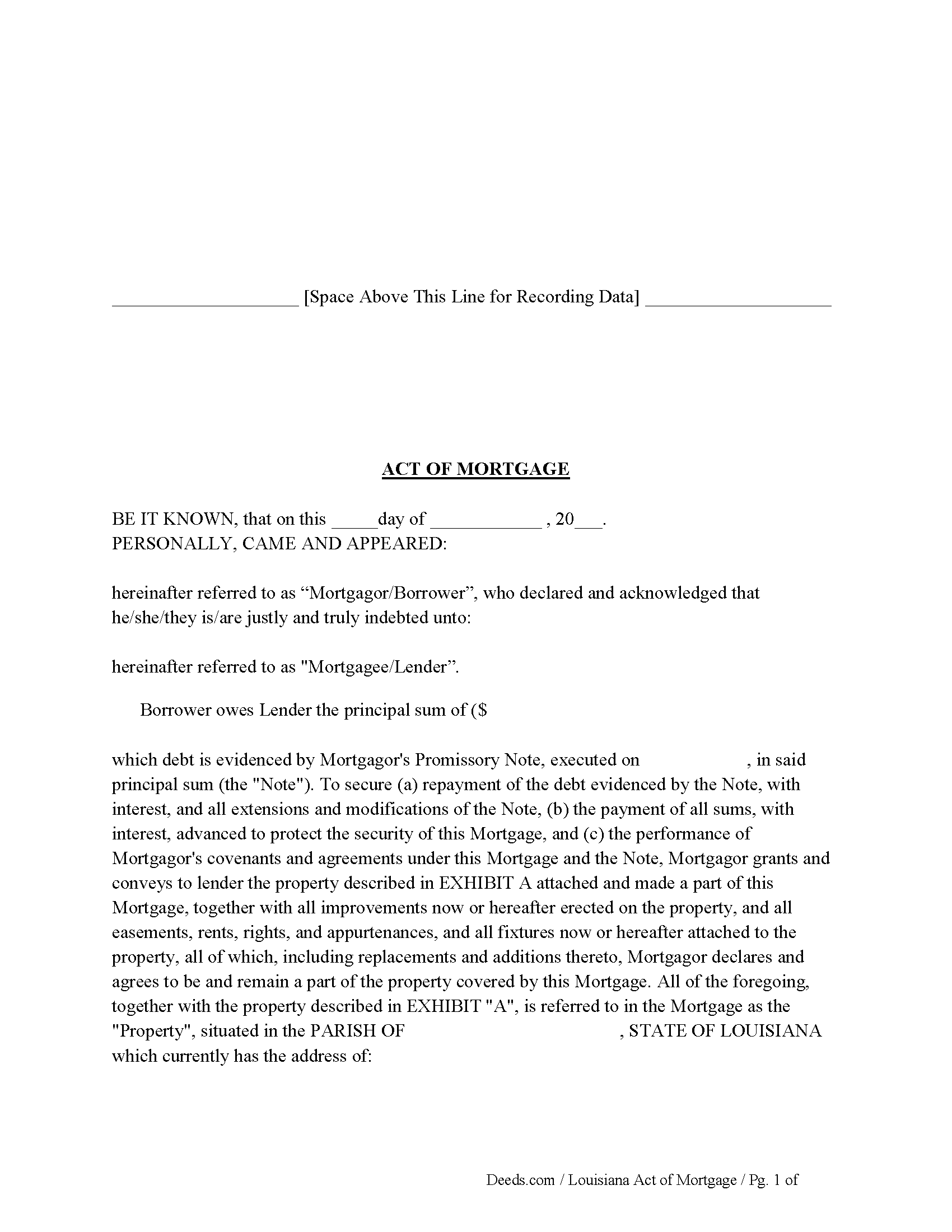
These forms establish a contract to secure the performance of an obligation. This (Mortgage gives the mortgagee)/lender, (upon failure of the obligor to perform the obligation that the mortgage secures, the right to cause the property to be seized and sold in the manner provided by law and to have the proceeds applied toward the satisfaction of the obligation in preference to claims of others.) (Art. 3279)
Art. 3280. Mortgage is an indivisible real right that burdens the entirety of the mortgaged property and that follows the property into whatever hands the property may pass.
Art. 3288. A contract of mortgage must state precisely the nature and situation of each of the immovables or other property over which it is granted; state the amount of the obligation, or the maximum amount of the obligations that may be outstanding at any time and from time to time that the mortgage secures; and be signed by the mortgagor.
Art. 3298. A. A mortgage may secure obligations that may arise in the future.
B. As to all obligations, present and future, secured by the mortgage, notwithstanding the nature of such obligations or the date they arise, the mortgage has effect between the part... More Information about the Louisiana Act of Mortgage and Promissory Note
Bond for Deed
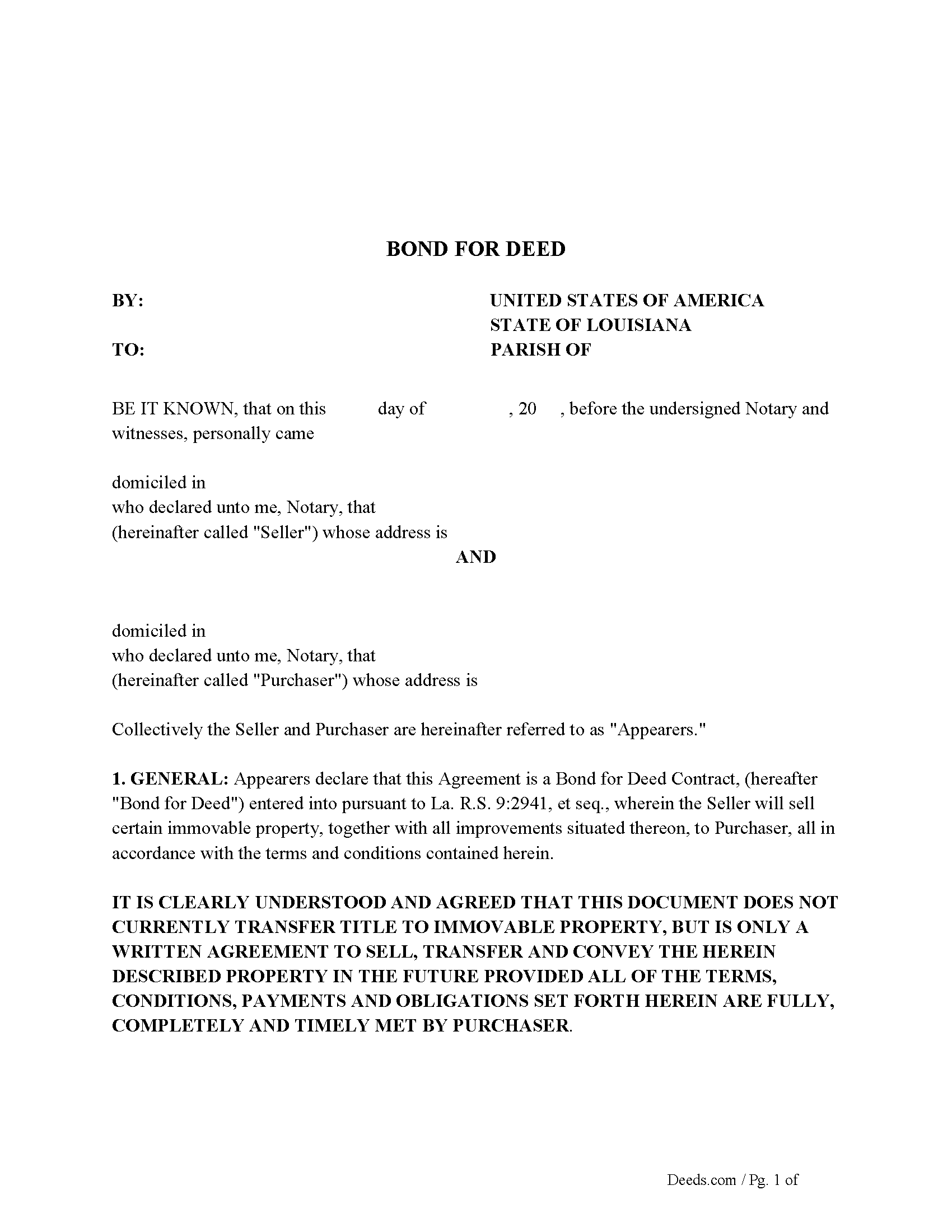
In other states a bond for deed is often referred to as a land contract or contract for deed. A bond for deed is a seller financing contract for the sale of real property.
2941. "Bond for deed" defined
A bond for deed is a contract to sell real property, in which the purchase price is to be paid by the buyer to the seller in installments and in which the seller after payment of a stipulated sum agrees to deliver title to the buyer.
2941.1. Recordation; subsequent filings; interest prohibited; cancellation of mortgage records
A. Upon the recordation in the mortgage and conveyance records of a bond for deed contract as defined in R.S. 9:2941, any sale, contract, counter letter, lease, or mortgage executed by the bond for deed seller, and any lien, privilege, or judgment relating to or purporting to affect immovable property that has not been filed previously for registry or recorded in the mortgage records shall be subject to the rights created by the bond for deed contract.
B. Following registry of the sale by bond for deed seller to the bond for deed purchaser, his successors or assigns, any such instrument or writing that was filed in the mortgage records after the fi... More Information about the Louisiana Bond for Deed
Cash Sale
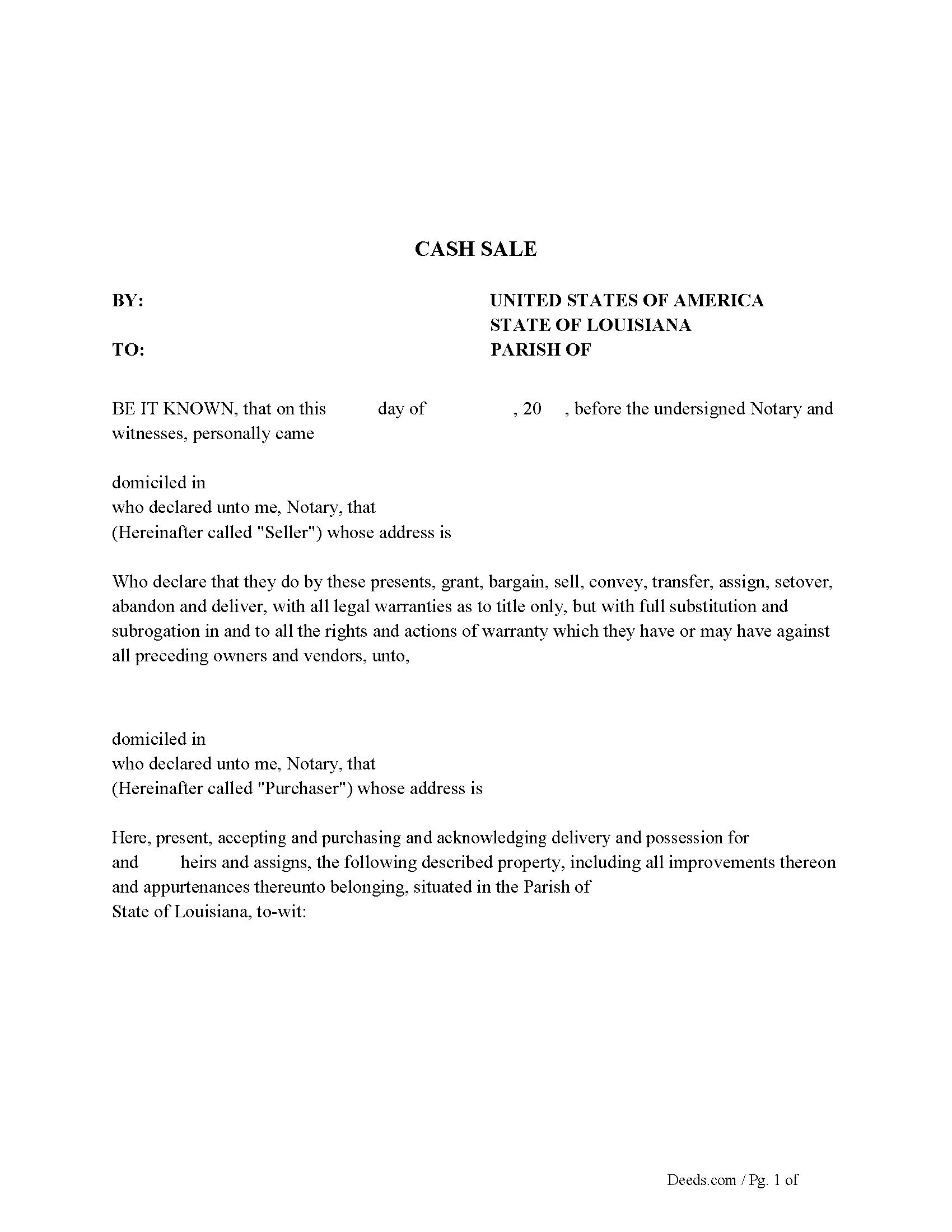
A Cash Sale form is used to sell real property outright and frequently used to settle a "bond for deed", (sometimes referred to as a land contract) when it has been paid in full. Buyer and Seller agree that property will be delivered with all legal warranties as to title only.
Waiver of Warranties
Purchaser(s), relieve and release Seller(s) from any claims or causes of action for redhibition pursuant to Louisiana Civil Code Article 2520.
The described property is sold "AS IS" without warranties.
Furthermore purchaser(s) agree to waive any claims for reduction of sales price pursuant to Louisiana Civil Code Article 2541, et seq.
Additionally, Purchaser(s) acknowledge(s) that this sale is made without warranty of fitness for ordinary or particular use pursuant to Louisiana Civil Code Article 2524.
Section 2520 - Warranty against redhibitory defects
The seller warrants the buyer against redhibitory defects, or vices, in the thing sold.
A defect is redhibitory when it renders the thing useless, or its use so inconvenient that it must be presumed that a buyer would not have bought the thing had he known of the defect. The existence of such a defect gives a buyer the r... More Information about the Louisiana Cash Sale
Easement Deed
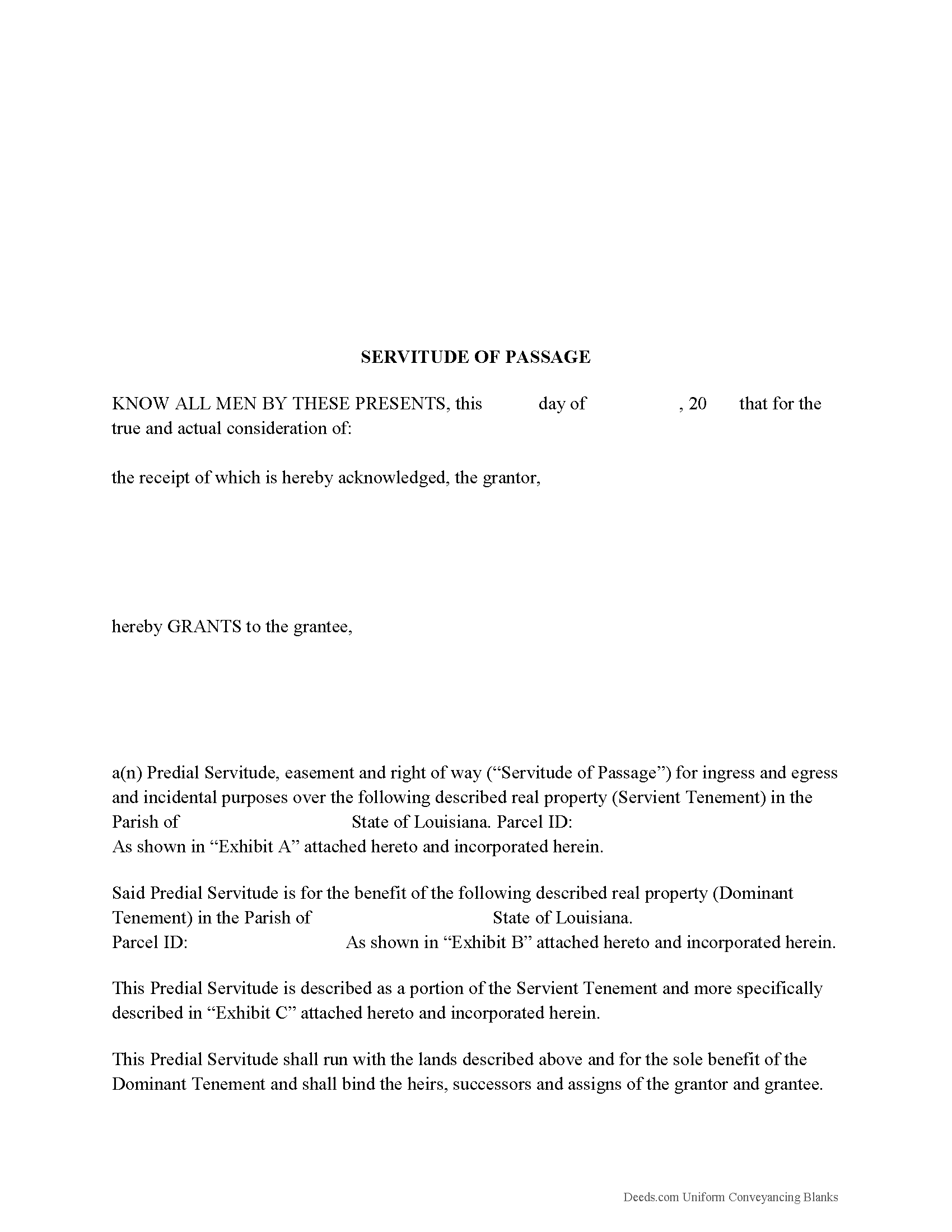
Louisiana law recognizes servitudes, which are similar to easements and can be defined as a burden or charge on one property that is for the benefit of another property. There are two types of servitudes: predial and personal (CC 533). A predial servitude is closely related to an easement appurtenant and is a burden on the servient estate for the benefit of the dominant of estate. A personal servitude is a charge or burden on something for the benefit of an individual. The three types of personal servitude are: usufruct (the use of property for a benefit as long as it is not damaged), habitation, and right-of-use (this is similar to an easement while allowing use of the property but denying full enjoyment of the property) (CC 534). A usufruct can be established by juridical act or by operation of law (CC 544).
As an interest in real property (immovable property) in Louisiana, an easement deed or servitude is subject to the laws of other real estate instruments. The grantor to an easement deed should sign the instrument and have his or her signature acknowledged. Some recording clerks in Louisiana will require the signature to be in authentic form, which although not a statutory ... More Information about the Louisiana Easement Deed
Termination of Easement
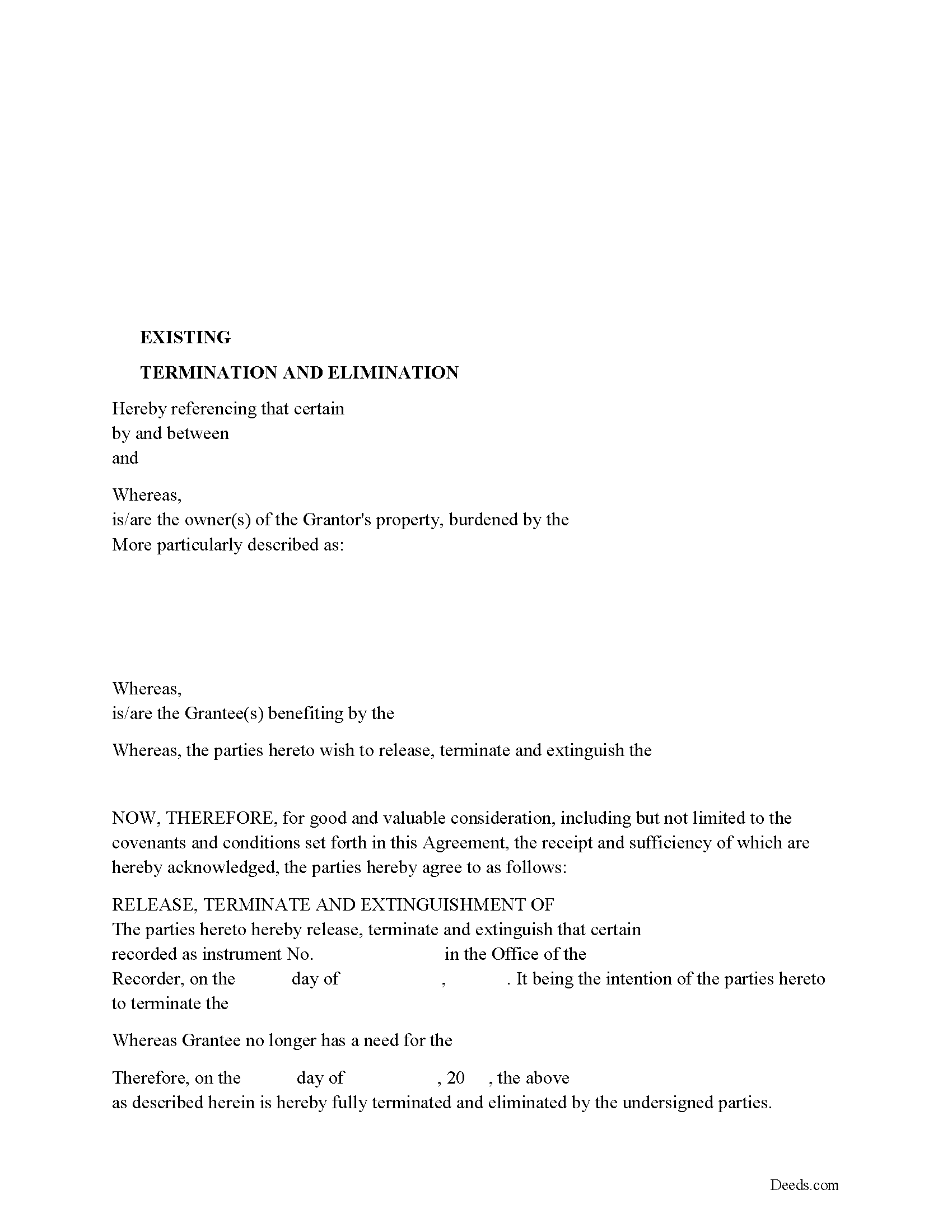
Use this form to release, terminate, extinguish a previously recorded document that involves access to and from a property.
Documents such as:
Easements (often called "Servitude of Passage" in Louisiana)
Access Roads
Right of Ways
Utility Easements (Power, Gas, Water, Sewer, Etc.)
Drainage Easements
This document allows the owner of the land, burdened by the access and the party that benefits from the access, to sign an agreement releasing the property from such access, under the premises the benefiting party no longer needs access.
This is a two page form plus two additional exhibit pages, that can be used to meet a specific situation.
Formatted to meet Louisiana Recording Requirements.
(Louisiana Termination Package includes form, guidelines, and completed example)... More Information about the Louisiana Termination of Easement
Mineral Deed
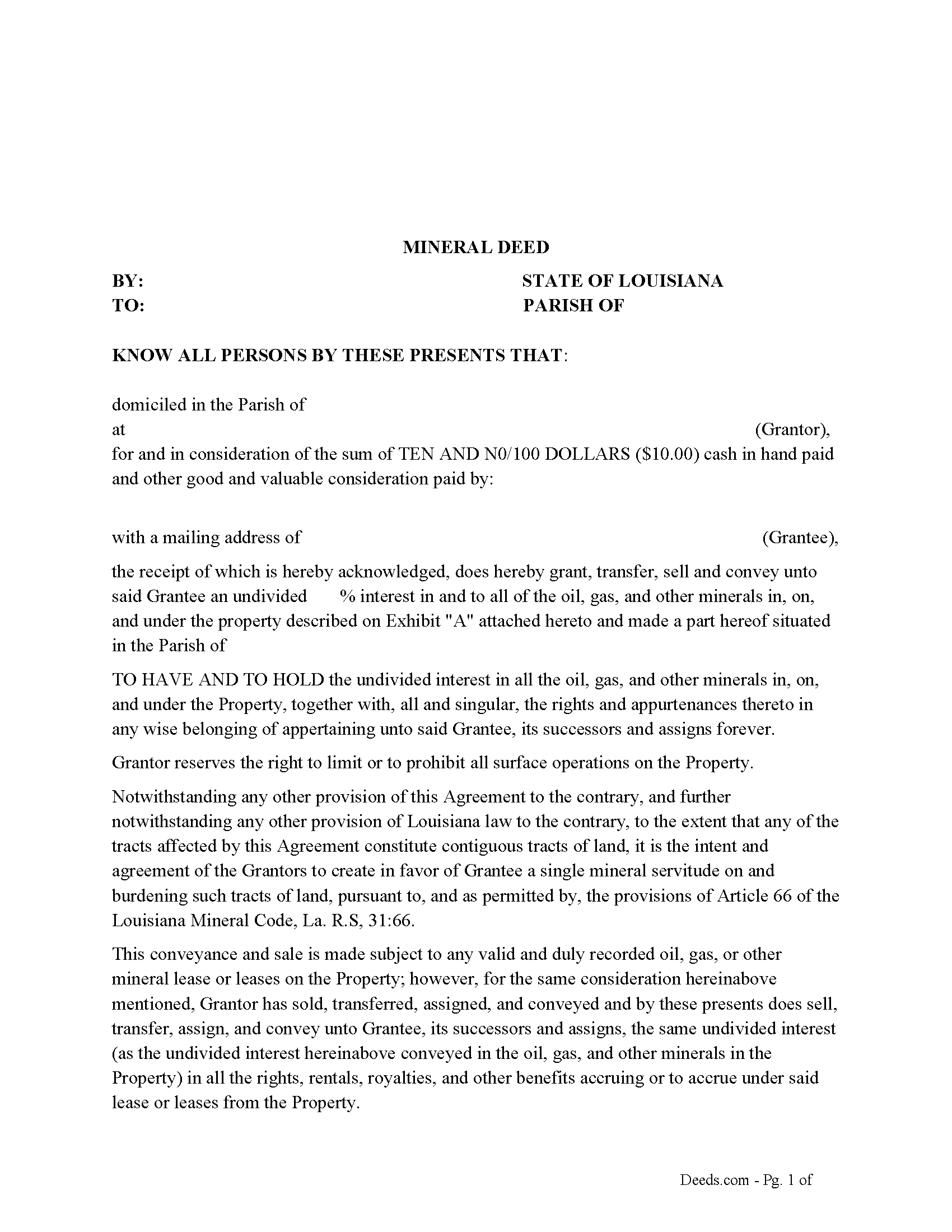
Use this form to grant mineral rights to another party. This can be done in percentages 0-100% depending on circumstances. (The basic mineral rights that may be created by a landowner are the mineral servitude, the mineral royalty, and the mineral lease.) [The situs of a mineral right is the parish or parishes in which the land burdened is located. All sales, contracts, and judgments affecting mineral rights are subject to the laws of registry.] (LA Rev Stat 31:16) [LA Rev Stat 31:18]
(Louisiana MD Package includes form, guidelines, and completed example) For use in Louisiana only.
... More Information about the Louisiana Mineral Deed
Mineral Deed with Quitclaim Covenants
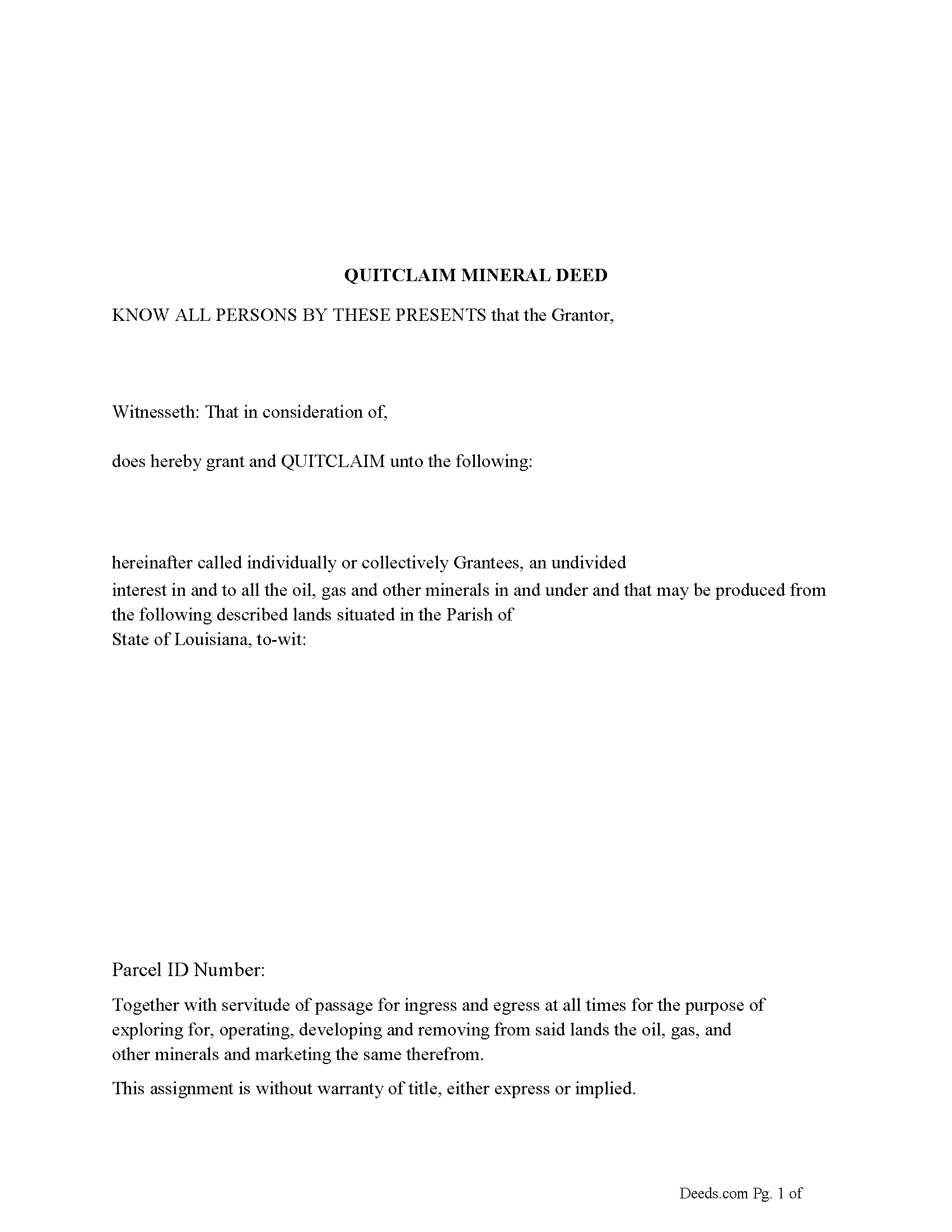
The General Mineral Deed for Louisiana Quitclaims oil, gas, and mineral rights from the grantor to the grantee. THIS IS NOT A LEASE. There are no Exceptions or Reservations included.
The transfer includes the oil, gas and other minerals of every kind and nature. The Grantor can stipulate the percentage of Mineral Rights the Grantee will receive.
This general mineral deed gives the grantee the right to access, for the purpose of mining, drilling, exploring, operating and developing said lands for oil, gas, and other minerals, and storing handling, transporting and marketing of such.
The seller, or grantor Quitclaims the mineral rights and does NOT accept responsibility to any discrepancy of title (This assignment is without warranty of title, either express or implied)
Uses: Mineral deeds with quitclaim are often used in situations where the grantor wants to quickly release any interest they might have in mineral rights, such as in settling estates, resolving disputes, clearing up uncertainties about ownership in a title's history or when mineral rights have previously been severed or fragmented from surface rights and cloud a title, making it difficult to transfer prope... More Information about the Louisiana Mineral Deed with Quitclaim Covenants
Disclaimer of Interest
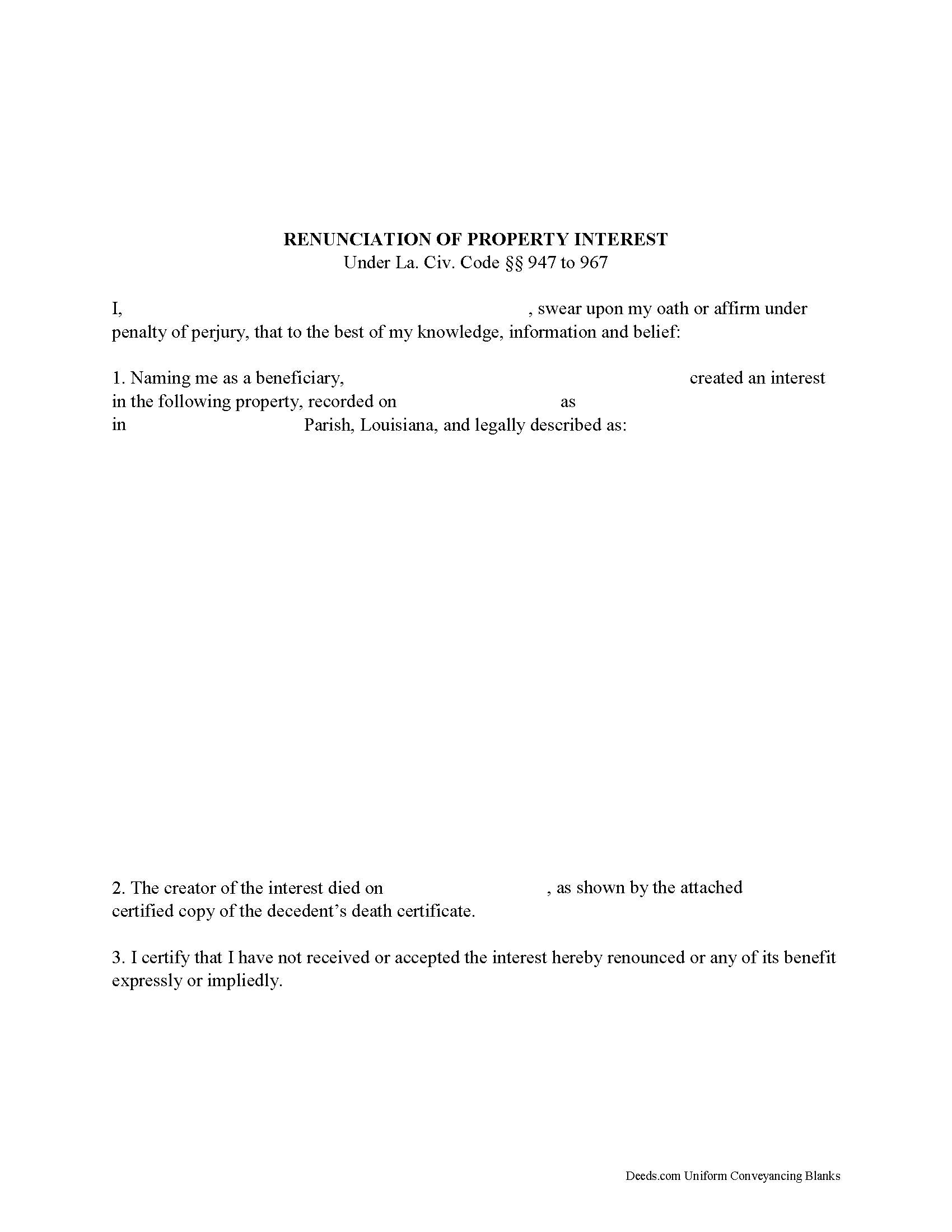
Louisiana Renunciation of Property Interest
Under the Louisiana Civil Code, the beneficiary of an interest in property may renounce the gift, either in part or in full (La. Civ. Code 947 to 967). Note that the option is only available to beneficiaries who have not acted in any way to indicate acceptance or ownership of the interest ( 957-959). Louisiana also provides the option of a donative renunciation, which allows an heir to renounce in favor of a third person to whom the inheritance would not devolve by statute or by will ( 960). For the specifics of this option, consult with an attorney.
Acceptance is presumed unless there is an official renunciation ( 962). The document must be in writing and include a description of the interest, a declaration of intent to renounce all or a defined portion of the interest, and be signed by the renouncing party ( 963).
Deliver the document within nine months of the transfer (e.g., the death of the creator of the interest) to the personal representative of the decedent's estate or the trustee, or file it with the court that has jurisdiction over proceedings regarding the estate of the deceased donor. If real property is involved... More Information about the Louisiana Disclaimer of Interest
Extract of Trust
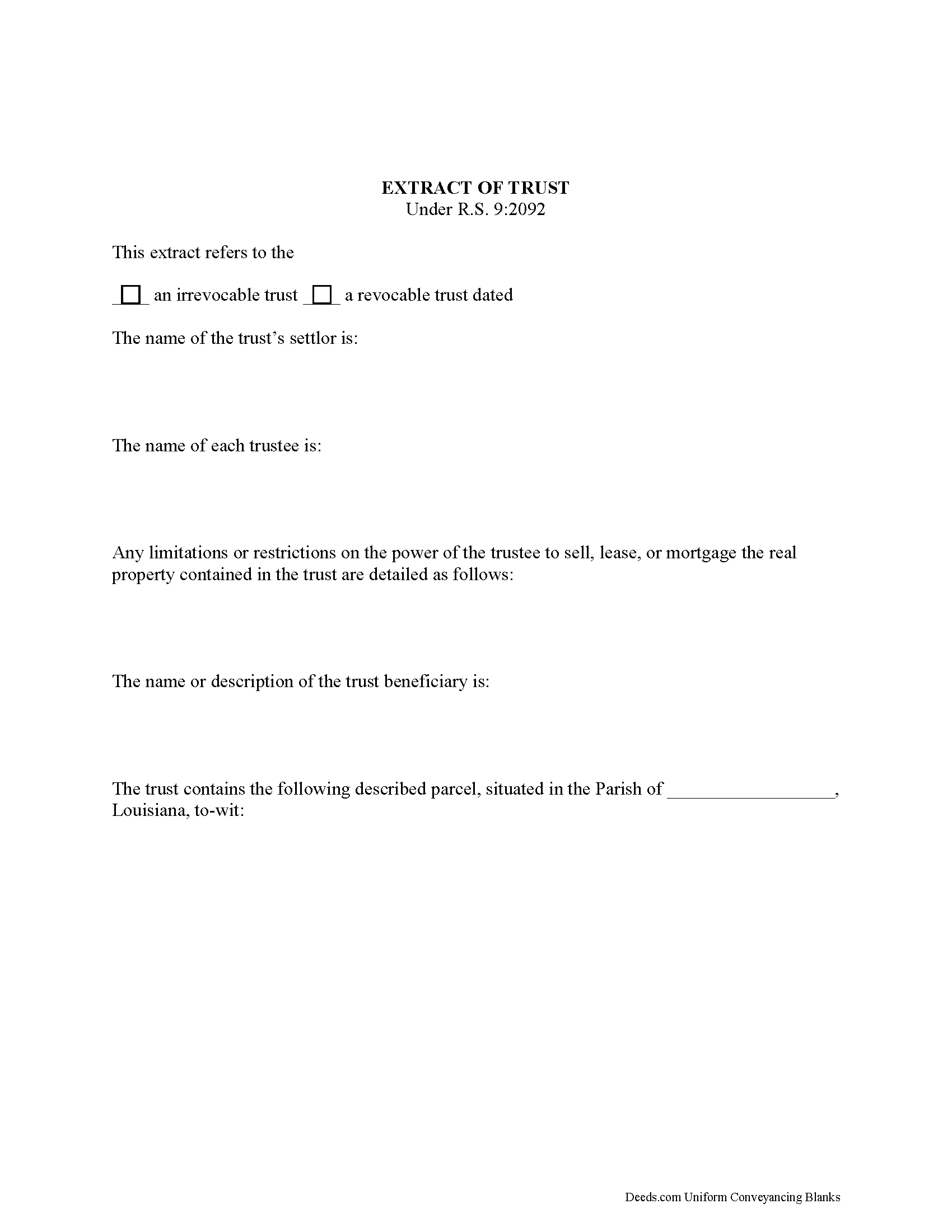
Extract of Trust: A Lagniappe that Will Set You up Right
A lagniappe is a little something extra. It might be the unexpected addition to make a recipe a little more exciting -- like a bit of chicory in an average cup of coffee. For a Louisiana trust containing titled property, an extract of trust is the lagniappe that brings the important facts into focus.
Under R.S. 9:2092(A) of the Louisiana Trust Code, "If at any time the trust property of either an inter vivos trust or a testamentary trust includes immovable [real property] or other property the title to which must be recorded in order to affect third parties, a trustee shall file . . . an extract of trust . . . for record in each parish in which the property is located."
The extract of trust, as the name suggests, is an abstract of the information about the trust. It is executed by either the trust's settlor or the trustee. The settlor is the person who created the trust (9:1761), and the trustee is any "person to whom title to the trust property is transferred to be administered by him as a fiduciary" and who is designated by the trust instrument (9:1781).
The document requires the name and date of the trust and ... More Information about the Louisiana Extract of Trust
Notice of Lis Pendens
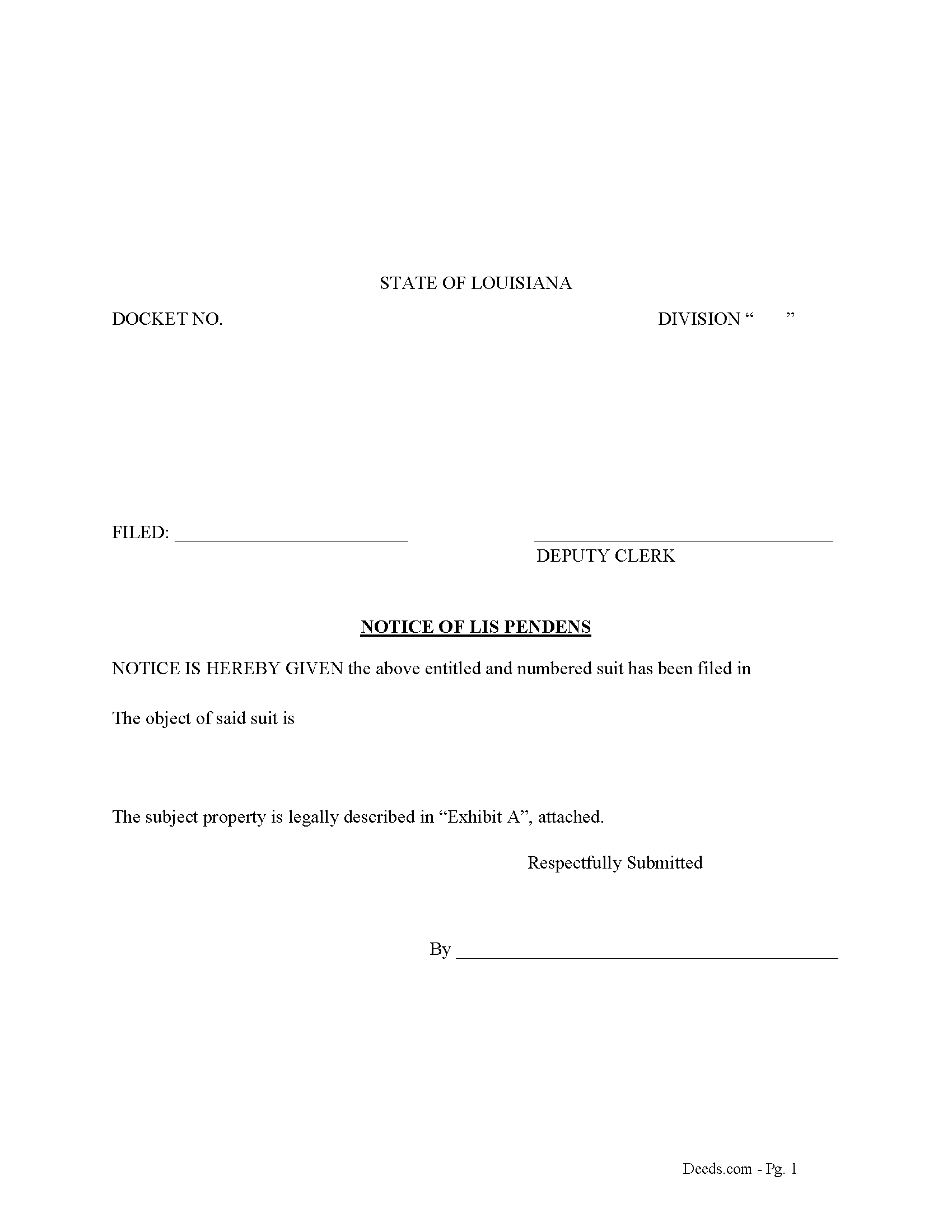
Lis Pendens - Latin for "Suit Pending", gives notice to third parties of (the pendency of an action or proceeding in any court, state or federal, in this state affecting the title to, or asserting a mortgage or privilege on, immovable property) [The notice referred to in Article 3751 shall be in writing, signed by the plaintiff, defendant, or other party to the action or proceeding who desires to have the notice recorded, or by a counsel of record for such party showing the name of the persons against whom it is to be effective, the name of the court in which the action or proceeding has been filed, the title, docket number, date of filing, and object thereof, and the description of the property sought to be affected thereby.] (Art. 3751. Notice to be recorded to affect third persons) [Art. 3752. Requirements of notice; recordation]
Louisiana Revised Statutes 47:2274 - Lis pendens
Terms Used In Louisiana Revised Statutes 47:2274
Lien: A claim against real or personal property in satisfaction of a debt.
Mortgage: The written agreement pledging property to a creditor as collateral for a loan.
Property: includes every form, character and kind of property, real, personal, ... More Information about the Louisiana Notice of Lis Pendens
Cancellation of Notice of Pendency
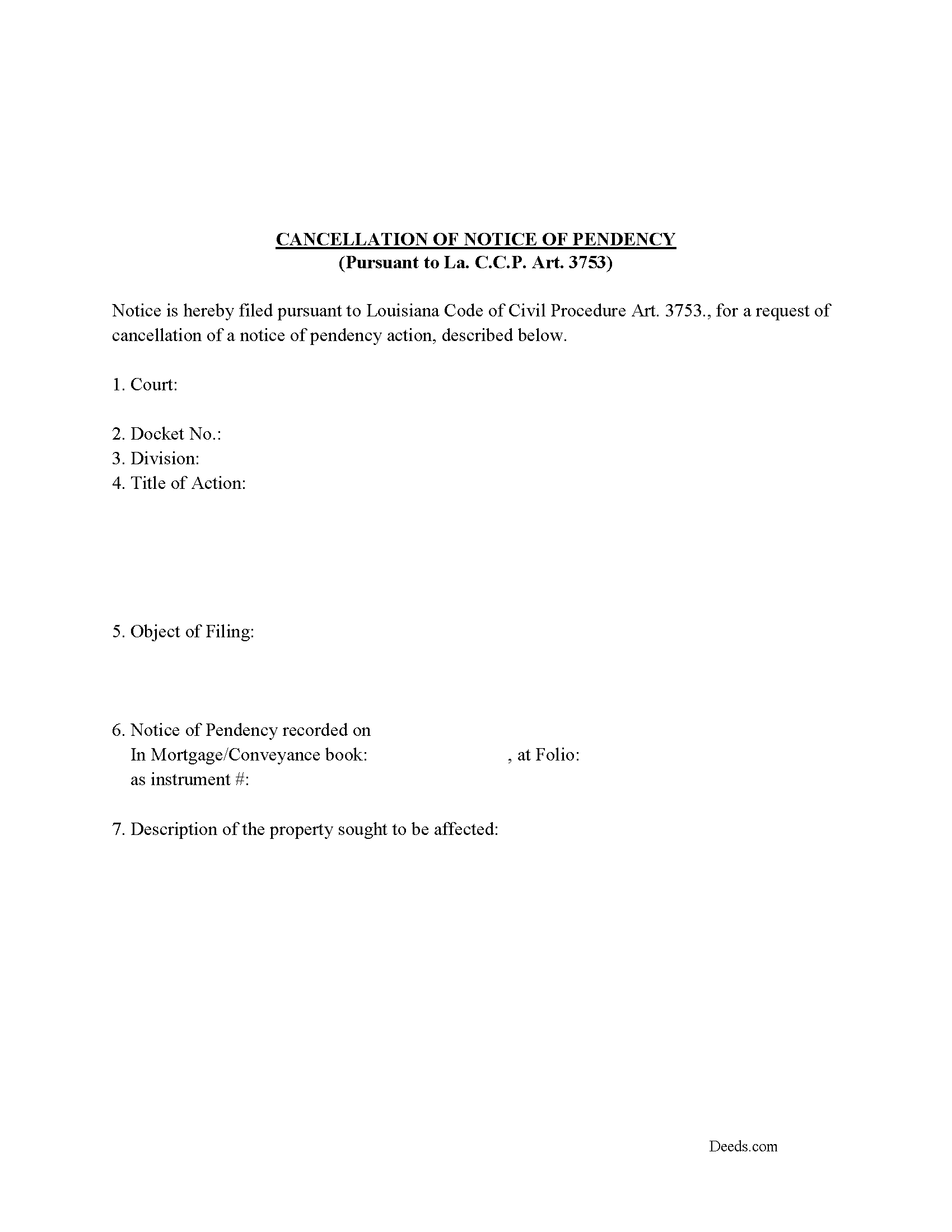
Use this form to cancel a previously recorded Notice of Lis Pendens/Pendency.
The cancellation is performed (at the request of any interested party if the judgment has been canceled or if the action or proceeding has been dismissed.) Once submitted [The recorder of mortgages or the recorder of conveyances shall cancel, erase, or terminate, as applicable, the acts on the request of the petitioner.] (CCP 3753 --- Cancellation of notice of pendency) [Louisiana Revised Statutes 47:2274 -- Lis pendens]
(Louisiana Cancellation Package includes form, guidelines, and completed example)... More Information about the Louisiana Cancellation of Notice of Pendency